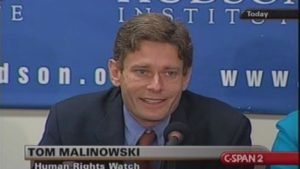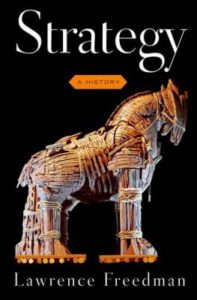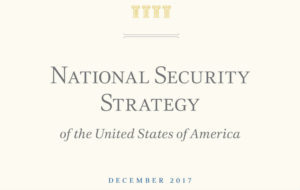 A new presence in Washington is likely to add a forceful voice in support of democracy and human rights, reports suggest.
A new presence in Washington is likely to add a forceful voice in support of democracy and human rights, reports suggest.
“The House has a voice which it can use to remind the rest of the world that the heart and soul of America has not changed,” said Tom Malinowski, a former human rights campaigner and assistant secretary of state under President Barack Obama, who will represent New Jersey’s 7th Congressional District after last week’s midterm elections, Foreign Policy reports:
What sets Malinowski apart from other lawmakers is his decades burrowed inside the Washington foreign-policy-making machine. It began in the mid-1990s, when he served as a speechwriter for Secretaries of State Warren Christopher and Madeleine Albright, then as a national security council staffer for President Bill Clinton. Later, he became director of the organization Human Rights Watch’s Washington office from 2001 to 2013, before joining the Obama administration as the State Department’s top diplomat on human rights.
“I think the House of Representatives has considerable powers to shine a spotlight on important issues, whether it’s our relationship with Saudi Arabia, or our approach to North Korea, or human rights issues around the world,” he told Foreign Policy’s Robbie Gramer. He said he is unsure of what committees he will join, including whether he’ll be on the House Foreign Affairs Committee, which oversees the State Department and U.S. Agency for International Development, but, “one way or another, I expect to be involved.”

Credit: ACUS
November 11 marked the 100th anniversary of the end of World War I: the Atlantic Council’s Daniel Fried writes on the importance of working with allied democracies:
The West faces aggression from Vladimir Putin’s Russia and challenges from China. More alarming are doubts and divisions from within, including the West’s questioning of its own model and values. These challenges have been years in the making. Economic stresses are one source. Another is concern about national identity in a time of increasing ethnic diversity, which has generated nativist reactions.
“Policy responses from mainstream political parties on both sides of the Atlantic appear inadequate, at least judging by electoral blowback, and a perceived failure of political systems is generating reaction against what many thought were settled fundamentals, adds Fried, a board member of the National Endowment for Democracy.
The world is threatened not by some nationalist upsurge, “sweeping them to remake the world in an ugly, pre-1914 image,” he tells the New York Times, but by isolationism, “tak[ing] the U.S. out of the game — à la the interwar period — long enough for one of the serious nationalists, Putin or Xi, to do major damage.”
 The lessons of World War I are many and varied for those who study warfare, notes Dr. Kori Schake, the deputy director-general of the International Institute for Strategic Studies:
The lessons of World War I are many and varied for those who study warfare, notes Dr. Kori Schake, the deputy director-general of the International Institute for Strategic Studies:
To name a few: economic interconnectedness does not avert armed conflict; democratic states are capable of making durable and costly commitments to both war effort and alliances; the decisiveness of battlefield outcome is a central determinant of the sustainability of peace settlements; technological innovation can radically alter the offense-defense balance in military operations; and “laws of war” can be developed that create enduring norms limiting classes of weaponry.
Both military and academic strategists eschew domestic politics because they’re messy, hard to model, and cloud the view of concrete elements that can be controlled and on which the fate of many conflicts rely, such as logistics, Schake writes for Lawfare:
But there is no substitute for having a strategy married to its times, to use Defense Secretary Jim Mattis’s term for the proper embedding of politics into strategy. The crafters of President Trump’s National Security Strategy heroically attempted to do just this, harnessing the president’s campaign agenda in developing the 2017 strategy.
 Ultimately, successful competition and cooperation depend on confidence in what the United States and other democratic states have to offer, according to Nadia Schadlow, who recently served as the deputy national security advisor for strategy on the National Security Council, is now a senior fellow at the Hudson Institute:
Ultimately, successful competition and cooperation depend on confidence in what the United States and other democratic states have to offer, according to Nadia Schadlow, who recently served as the deputy national security advisor for strategy on the National Security Council, is now a senior fellow at the Hudson Institute:
The United States does not seek vassals, but strong and capable partners. We should not and cannot impose our values on other societies. Promoting liberty by force is illiberal and doomed to failure. But using a full range of its economic and political instruments, America can continue to be the catalyst for positive developments in key regions.
“Recognizing the forces that animate relations between nations is not cynical: It is clarifying and refreshing,” Schadlow adds. “It allows us to think clearly about restoring fair and reciprocal trade relationships; protecting our open systems from manipulation; and understanding the vital importance of defending and strengthening free societies.”







